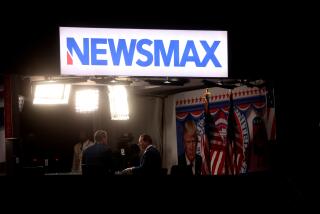DirecTV deal aids 2 media moguls
- Share via
A long-awaited agreement reached Friday in which News Corp. Chairman Rupert Murdoch gains a bigger stake in his own company by trading his satellite TV interests to former cable kingpin John Malone frees each man to pursue broader ambitions in his medium of choice.
Murdoch expects faster growth in the Internet business than he does in U.S. satellite TV distribution. By solidifying control of News Corp., Murdoch can more easily seek out deals like the 2005 acquisition of the MySpace.com social networking site.
Meanwhile, Malone is unlikely to settle for the investment in El Segundo-based DirecTV Group Inc. that he gets from Murdoch.
Malone is expected to try to merge DirecTV with rival EchoStar Communications Corp., operator of the Dish Network. He also may team with a telephone company to offer the broadband and phone services that cable operators sell.
Friday’s deal involves News Corp. swapping its 38.5% stake in DirecTV to Malone’s holding company, Liberty Media Corp., for that firm’s 16.5% stake in News Corp., valued at about $11 billion. Murdoch’s ownership of voting stock in the New York company, parent of movie studio 20th Century Fox and the Fox television network, will rise from about 30% to about 38%.
Analysts saw more benefits for News Corp. than Liberty.
The elimination of Liberty’s stake is tax-free for News Corp. and amounts to one of the largest share repurchases in history. That should increase earnings per share by almost 9%, wrote UBS analyst Aryeh Bourkoff.
News Corp. spokesman Andrew Butcher also confirmed that the company’s regular $6-billion buyback plan, which had been on hold during the talks with Malone, would now resume. The company is authorized to spend the remaining $3.4 billion in that plan over the next 18 months, he said.
Malone moved to the background in the world of big media since selling Tele-Communications Inc., one of the largest cable television companies, in 1999 and has been hungry for a comeback. Relations between Murdoch and Malone, once close, grew strained after Malone acquired his News Corp. stake.
Friday’s deal, which has been in the works for two years, is expected to close in mid-2007. Beyond the stock swap, it calls for News Corp. to send Englewood, Colo.-based Liberty $550 million in cash and three of the smallest of Fox’s 16 regional cable sports networks -- those based in the Northwest, the Rocky Mountain area and Pittsburgh.
Malone managed to get the DirecTV stock at an implied value of about $21 a share, analysts said, well below Thursday’s $25 closing price. But even with that bargain and the extra cash changing hands, analysts expressed concerns about Liberty’s new challenges in the satellite TV business, and Fitch Ratings downgraded its opinion of the company’s creditworthiness.
Still, Liberty Chief Executive Greg Maffei said in a statement that the transaction was “a critical step” in the effort to change Liberty into a “well-positioned, focused operating company.”
Liberty expects to get four of DirecTV’s 11 board seats, Liberty spokesman John Orr said.
“Our goal is to work with them, to be a good strategic partner,” Orr said.
Effective control of DirecTV could lead to distribution of programming for such Liberty assets as Starz Entertainment and home shopping channel QVC.
Malone’s chances of merging DirecTV and EchoStar are unclear because previous attempts have been thwarted by antitrust objections.
But the same issues that made DirecTV less appealing for Murdoch -- including the faster growth of cable TV and cable’s greater number of interactive features -- would make it easier for Malone to argue that a dominant satellite service would not harm competition or consumers.
A DirecTV spokesman didn’t return messages, and EchoStar declined to comment.
News Corp. Class A shares dropped 5 cents to $21.53. Liberty’s tracking stock rose $4.23 to $97.87, and DirecTV’s fell 45 cents to $24.55.
More to Read
The biggest entertainment stories
Get our big stories about Hollywood, film, television, music, arts, culture and more right in your inbox as soon as they publish.
You may occasionally receive promotional content from the Los Angeles Times.










